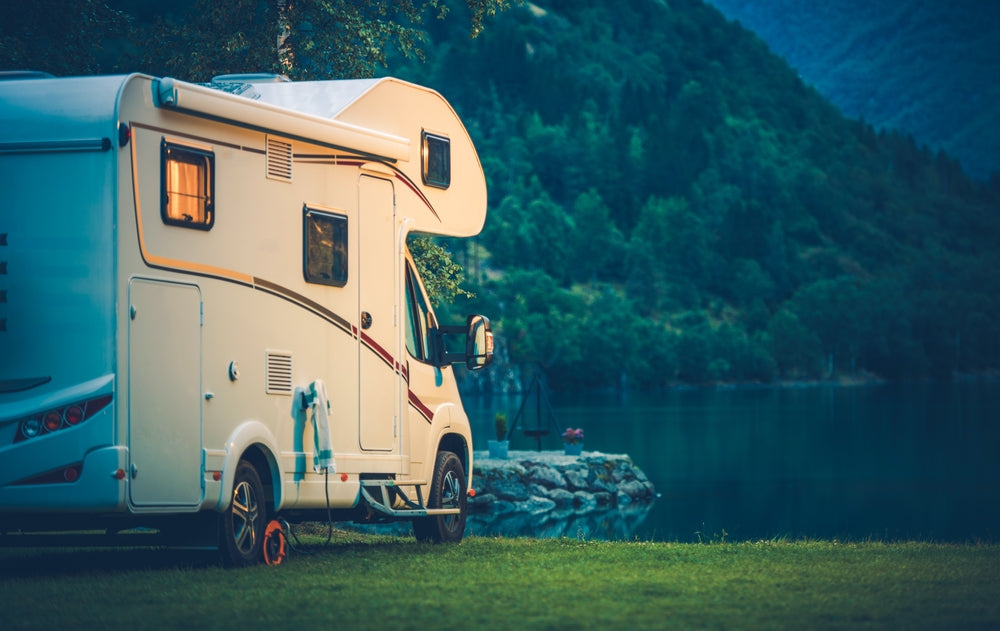Have you always wanted to dry camp in your RV? Dry camping, also known as boondocking, refers to camping in a location where electric, water, and sewer connections are not available at the campsite.
Although dry camping may seem intimidating, there is nothing like the feeling of setting up camp in remote, scenic RV campsite out in uncharted areas. However, it requires more than just filling up your tank and hitching up your rig. A completely unplanned dry camping RV trip can lead to stress and disappointment. The secret to enjoying your dry camping experience is becoming self-reliant. While some may have the notion that RV dry camping is all about spontaneity, it requires preparation and practice to have freedom and independence from the grid and full-hookups.
Read on for tips and tricks for successful RV dry camping and boondocking.
Wild and Free Camping
-
Upgrade your RV's lead-acid battery to a lighter and longer-lasting lithium-ion.
Camping off the grid doesn't mean you have to live without the comfort of electricity. Whether you're looking to keep a few lights on, juice up your smartphone, or fully power your RV, an understanding of battery capacity and power management is essential. While most RVs are equipped with lead-acid batteries, seasoned RVers prefer lithium for a slew of reasons, including weight, maintenance, lifespan, size, discharge speed, and more.
At Lion Energy, we offer the latest in Lithium battery technology in the Safari LT. This cutting-edge power unit replaces traditional deep-cycle lead-acid batteries with the safest Lithium – Iron Phosphate. It's a "plug and play," so campers can remove the deep cycle lead-acid battery from their RV and replace it with this superior performing battery.
Using lithium-ion technology, the Safari UT can be drained and recharged over 3,500 times, outlasting any lead-acid battery by years. The Safari UT is also virtually maintenance-free, meaning you don't have to charge it every 3-4 months or deal with fluids.
The Safari LT has twice the camping time as a regular lead-acid battery. It's also completely renewable by the sun, which means you have a virtually unlimited source of power in your RVs, campers, trailers, home, and more. It can hold its charge for up to 2 years and can be recharged after that time too.
If you're frustrated with always having to run generators on gas or dealing with the noise and pollution, you'll be glad your found Lion Energy and our battery solutions.
2. Charge your RV's battery with renewable resources.
We recommend using solar panels to power your RV and charge your batteries. Solar panels are gaining popularity as an environmentally-friendly option, as they only use the sun's energy to produce power without any emissions or by-products.
This is an especially great option for dry campers and those who wish to stay off the grid. Our ultra efficient rugged solar panels give you the most power anywhere. With an easy to use plug and play setup, these are ready to go anywhere, anytime. Power everything from Rvs to boats, our 100 watt roof mount solar panels can charge all 12-volt batteries and battery banks, including lithium.
Newer RVs are built with pre installed solar panels. However, for older models, solar kits are the most straightforward option available. These systems are compact enough to keep your battery charged up to meet the power needs of your entire rig.
3. Light up your campground with LED bulbs.
If the milky way doesn't light up your campground enough, hang up a string of LED bulbs. These energy-efficient bulbs are especially handy as camping lights since they use up to 90% less energy than typical incandescent bulbs. Plus, they don't produce heat, last up to 50 times longer than a traditional bulb.
If you're sleeping in a tent or have an RV awning without pre-equipped LED rope lighting, outdoor camping lights can keep your campsite lit until you hit the hay. Lion Energy's three LED lights are 2 watts each. Each cord has 15 feet with an individual switch.
LED lights, which stands for light-emitting diode, have been around since the early 1960s, but until recently, the bulbs were fragile and expensive. LED lights provide a bright, vibrant light without absorbing a lot of electricity. Plus, LED's are much safer than traditional bulbs since they emit little to no heat.
4. Pack a compact vehicle jumping system.
The Cub MS will do a lot more than jump-start your vehicle, RV, and large boat engine. It can also charge phones, tablets, ham radios, or anything that can charge from a USB cable. Recharge the Cub MS from the wall or the 12-volt plug in your car.
5. Research Boondocking Sites
Now that you're equipped with Lion Energy's Off Grid Camping Kit, it's time to test your boondocking skills. Believe it or not, you can find free camping in every state across the United States. Keep in mind that your options will vary depending on your comfort level and camping style.
Here is a short list of websites and mobile apps to help you find campsites and camper reviews.
- Campendium
- Google Maps and Google Earth
- FreeCampsites.net
- Harvest Hosts
- RV Park Reviews
- US Public Lands App
Give Lion Energy a Try
We hope these tips will lead you towards achieving self-sufficiency in your RV. Remember, it takes practice, preparation, and perseverance. At Lion Energy, we’re evolving the powering of everyday life with portable, renewable energy. for those who are unafraid to take on life. Our team is committed to providing our customers peace of mind and the freedom to live life on their terms.

Share:
Making Sense of Battery Ratings
How to be Ready For Hurricane Season